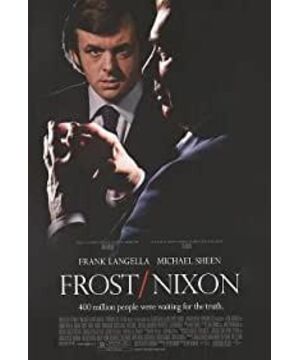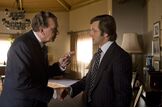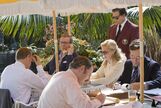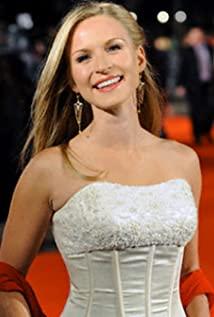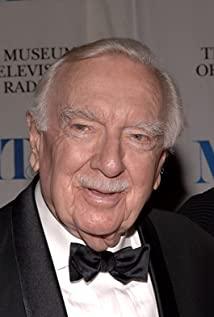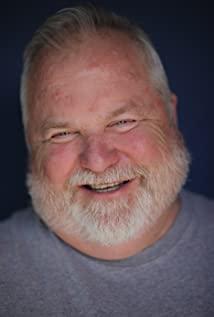"I let the American people down." In the big close-up, Nixon's wrinkled face looked tired and tired. Earlier, he was dismissed from the position of president in the Watergate incident that was revealed by installing a bug in the room of his opponent. He trampled on the U.S. Constitution as president, but he never publicly apologized for it. Until this moment.
It was David Foster sitting in front of him who made him say this, the talk show host on British television. He became the first and only person to interview Nixon after the Watergate Incident in the disdain and surprise of all American journalists.
No one expected Foster to successfully visit Nixon. First, Nixon was finally pardoned by the successor President Ford to avoid the embarrassment of going to court. Why did he take the initiative to accept interrogation from the media? Second, even if Nixon wants to talk, where does Foster get in his turn? The United States is much like Mike Wallace in "60 Minutes" and so on, while Foster is little known in the United States. He had just been canceled in New York due to poor ratings and was forced to travel between London and Australia every week. Host the "Thrilling Escape".
But the opportunity fell on Foster's head. Nixon was fancying his namelessness and powerlessness. He expected that he would have the upper hand. First, he wanted to use the show to clarify himself, eager to rebuild his image, and even return to the political stage; second, he took the opportunity to earn some pocket money-he borrowed his agent. Zhikou asked Foster for an interview fee of $600,000.
Nixon had the absolute upper hand in the first three episodes of the TV show divided into four episodes. This expert who had negotiated with Khrushchev and Mao Zedong effortlessly dealt with all questions, changing the subject, magnifying irrelevant details, delaying time, and focusing on his own political achievements. Three visits were quickly consumed like garbage time.
What made him give up resisting on the fourth day? In the last episode of the show, Nixon not only expressed his regret, but also frankly stated his long-standing belief: "Whatever the president does is legal." Based on these two words from the heart, this show It has become a classic and a credible source for many scholars to study Nixon.
Why did Nixon speak his heart? It is true that in the film, Foster prepared more than before for the final interview. With the help of his hand, he found the evidence that was missed in the Watergate incident, and waited for the opportunity to ambush with hard questions, which caught the opponent off guard. But all this stemmed from Nixon's phone call late at night. He complained, ranted, and chattered endlessly, allowing Foster to get a glimpse of the fragile side behind the giant. In fact, they are just lonely losers. They all fought desperately to enter the mainstream, but what they got was always ridicule and neglect. They all had glorious careers, but they still couldn't get rid of the faint inferiority in their hearts.
Nixon may be open to seeing such similarities. It's not so much that he lost to Foster's question, it's better to say that he lost to himself. He finally removed his armor and returned to an ordinary man. In the close-up feature, he is fragile, feeble, and sentimental, and he is almost forgiven for the sin he has committed.
It's just that the movie is always a movie. It deliberately weakened Foster and made Nixon a man of great charm. And history has not moved people like this. Opinion polls at the time showed that 69% of American audiences who had watched the show believed that Nixon still wanted to conceal his fault, 72% insisted that Nixon was guilty, and 75% believed that Nixon could no longer return to the political arena.
In reality, Nixon had never made the leaking call, and Foster was not so vulnerable. In fact, he has been quite knowledgeable in interviewing politicians. He is the only person in the history of journalism who has interviewed six British prime ministers and seven American presidents. Nixon was not the first. It is undeniable that the dialogue with Nixon was the pinnacle of Foster's career, and its uniqueness and importance paved the way for his future career. Foster quickly appeared on the covers of "Time" and "Newsweek", and based on his reputation, he interviewed Ford, Jimmy Carter, Reagan, Bush, Clinton, and Bush Jr., winning both fame and fortune.
Nixon did not suffer either. Not only did he get an interview fee of $600,000, but he also received an income not mentioned in the movie-a 20% dividend of the TV interview income. You must know that the ratings set for that episode have not been broken in American political news programs, and Foster alone made a million dollars.
History is more ruthless than movies. I thought that this conversation was the spark of the collision of two frustrated people, but it turned out to be a win-win situation for two smart people.
View more about Frost/Nixon reviews


